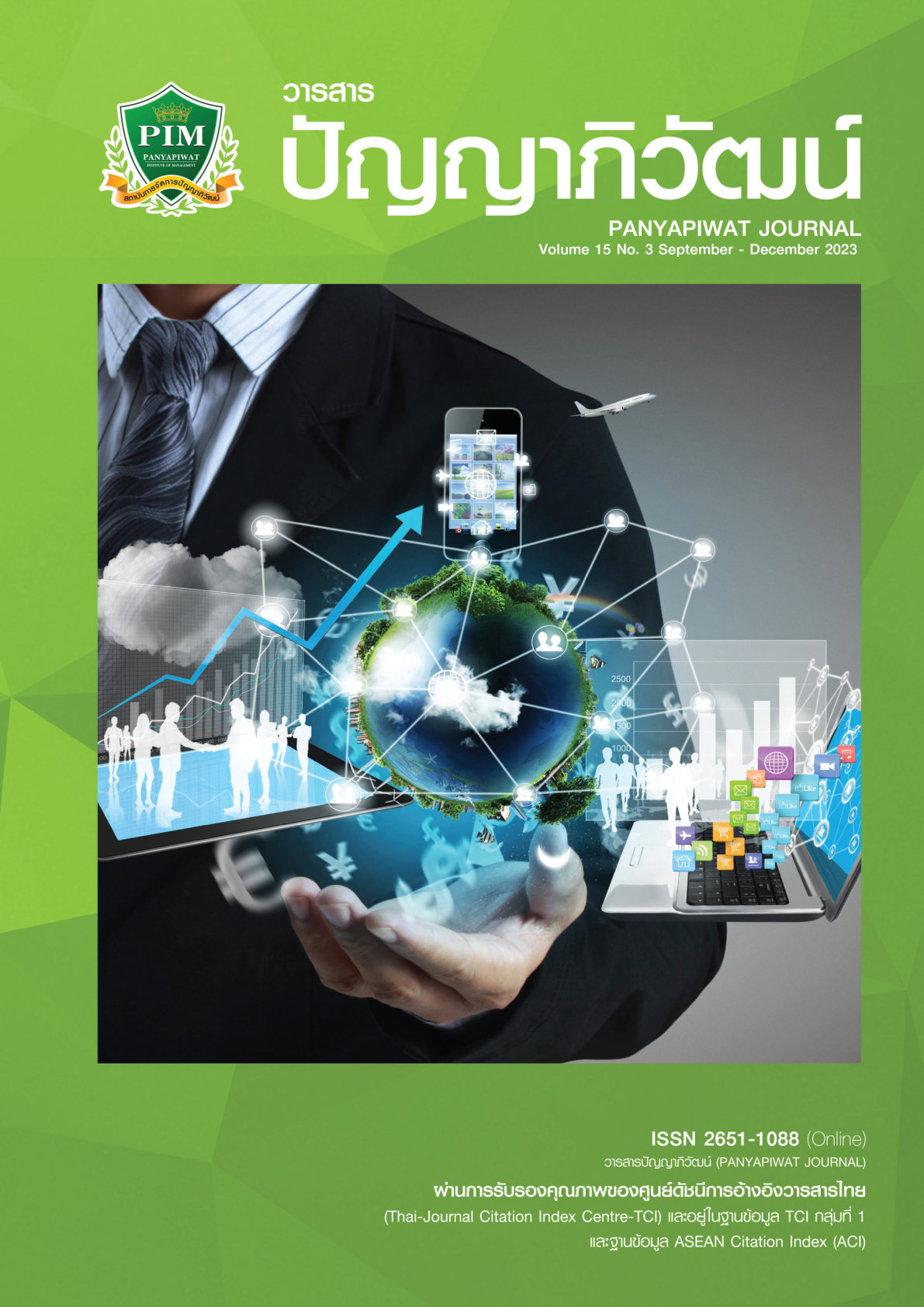การยอมรับการใช้แอปพลิเคชันมือถือของกลุ่มผู้สูงอายุประเภทติดสังคมในประเทศไทย
Main Article Content
บทคัดย่อ
วัตถุประสงค์ของงานวิจัยนี้เพื่อศึกษาถึงปัจจัยที่มีผลต่อความตั้งใจในการใช้แอปพลิเคชันมือถือของกลุ่ม ผู้สูงอายุประเภทติดสังคมในประเทศไทย โดยใช้แบบสอบถามเก็บข้อมูลจากกลุ่มผู้สูงอายุประเภทติดสังคมในประเทศไทยจำนวน 480 คน สถิติที่ใช้ในการวิเคราะห์ข้อมูล ประกอบไปด้วย ค่าร้อยละ ค่าเฉลี่ย ค่าส่วนเบี่ยงเบนมาตรฐาน และการวิเคราะห์การถดถอยเชิงเส้นพหุคูณ
ผลการวิจัยพบว่า กลุ่มตัวอย่างส่วนใหญ่เป็นเพศหญิง มีอายุระหว่าง 60 ถึง 69 ปี ร้อยละ 61.0 โดย กลุ่มตัวอย่าง ร้อยละ 81.9 สถานภาพสมรส และการศึกษาอยู่ในระดับมัธยมศึกษา ร้อยละ 33.8 มีรายได้ระหว่าง 30,001 ถึง 35,000 บาท ร้อยละ 20.2 กลุ่มตัวอย่างอาศัยอยู่กับลูกหรือญาติ ร้อยละ 76.7 โดยสามารถช่วยเหลือตัวเองได้ 90.4 และเข้าร่วมกิจกรรมทางสังคมเป็นบางครั้ง ร้อยละ 64.6 สำหรับปัจจัยที่มีผลต่อความตั้งใจในการใช้แอปพลิเคชันมือถือของกลุ่มผู้สูงอายุประเภทติดสังคมในประเทศไทยพบว่า มี 4 ปัจจัย คือ 1) ปัจจัยด้านความเคยชิน (P < .001) 2) ปัจจัยต้านแรงจูงใจด้านความบันเทิง (P < .001) 3) ปัจจัยด้านสภาพสิ่งอำนวยความสะดวกในการใช้งาน (p < .001) และ 4) ปัจจัยด้านอิทธิพลของสังคม (p < .001) ส่วนสมการถดถอยเชิงเส้นแบบพหุคูณ ได้แก่
ŷ = .887 + .605𝒳7 + .233𝒳5 -.168𝒳4 + .141𝒳3 (SEE = 0.408, R2 = 0.677, adj. R2 = 0.674)
ซึ่งสามารถพยากรณ์ความตั้งใจในการใช้แอปพลิเคชันมือถือของกลุ่มผู้สูงอายุประเภทติดสังคมในประเทศไทยไต้ร้อยละ 67.4
Article Details

อนุญาตภายใต้เงื่อนไข Creative Commons Attribution-NonCommercial-NoDerivatives 4.0 International License.
“ข้าพเจ้าและผู้เขียนร่วม (ถ้ามี) ขอรับรองว่า บทความที่เสนอมานี้ยังไม่เคยได้รับการตีพิมพ์และไม่ได้อยู่ระหว่างกระบวนการพิจารณาลงตีพิมพ์ในวารสารหรือแหล่งเผยแพร่อื่นใด ข้าพเจ้าและผู้เขียนร่วมยอมรับหลักเกณฑ์การพิจารณาต้นฉบับ ทั้งยินยอมให้กองบรรณาธิการมีสิทธิ์พิจารณาและตรวจแก้ต้นฉบับได้ตามที่เห็นสมควร พร้อมนี้ขอมอบลิขสิทธิ์บทความที่ได้รับการตีพิมพ์ให้แก่สถาบันการจัดการปัญญาภิวัฒน์หากมีการฟ้องร้องเรื่องการละเมิดลิขสิทธิ์เกี่ยวกับภาพ กราฟ ข้อความส่วนใดส่วนหนึ่งและ/หรือข้อคิดเห็นที่ปรากฏในบทความข้าพเจ้าและผู้เขียนร่วมยินยอมรับผิดชอบแต่เพียงฝ่ายเดียว”
เอกสารอ้างอิง
Department of Older Persons. (2020). Strategy of the department of elderly affairs 20 years 2018-2037. https://www.dop.go.th/download/knowledge/th1539-326153-138_0.pdf [in Thai]
Department of Older Persons. (2022). Statistics on the number of elderly people in Thailand from 2017 to 2022. https://www.dop.go.th/th/know/side/1/1/1159 [in Thai]
Foundation of Thai Gerontology Research and Development Institute. (2018). Active and productive aging: Challenges that Thailand must meet. Foundation of Thai Gerontology Research and Development Institute. [in Thai]
Foundation of Thai Gerontology Research and Development Institute. (2022). Situation of the Thai older persons 2021. Institute for Population and Social Research Mahidol University. [in Thai]
Health data center. (2022). Percentage of healthy aging fiscal report. https://hdcservice.moph.go.th/hdc/reports/report.php [in Thai]
Jumneansuk, A. (2018). Quality of life among home bound elder in Sakaeo Province. VRU Research and Development Journal Science and Technology, 13(3), 1-11. [in Thai]
Kaewkingchan, W. (2021). The lifestyle of the elderly affecting the use of communication innovation [Master’s thesis]. Naresuan University. [in Thai]
Khamrod, S., & Srikhaetai, K. (2018). The multiple regression model for learning achievement in science and mathematics of undergraduate y students. Apheit Journal, 7(1), 92-103. [in Thai]
Kleechaya, P. (2021). Research on the use of digital technology of the elderly and proposals for enhancing the power of the Thai elderly. https://opac01.stou.ac.th./cgi-bin/koha/opac-detail.pl?biblionumber=1624-85&shelfbrowse_itemnumber=563048 [in Thai]
Lee, C. C., Czaja, S. J., & Sharit, J. (2008). Training older workers for technology-based employment. Educational Gerontology, 35(1), 15-31.
National Statistical Office. (2015). Factors affecting internet usage for the elderly in Thailand 2014. http://www.nso.go.th/sites/2014/DocLib13/%E0%B8%94%E0%B9%89%E0%B8%B2%E0%B8%991CT [in Thai]
Nochot, B. (2021). Experience and technology acceptance of Post-retirement people in Bangkok and Metropolitan area that affected willingness to use e-book [Master’s thesis]. Silpakorn University. http://ithesis-ir.su.ac.th/dspace/handle/123456789/3597 [in Thai]
Nunnally, J. C. (1978). Psychometric theory (2nd ed.). McGraw-Hill.
Office of the National Economic and Social Development Council. (2019). Trends in the number of elderly people in Thailand. http://www.nesdb.go.th/main.php?filename-=index
Office of the Permanent Secretary, Ministry of Public Health. (2022). Hospital activities. http://bps.ops.moph.go.th/H.doc [in Thai]
Quan-Haase, A., Mo, G. Y., & Wellman, B. (2017). Connected seniors: How older adults in East York exchange social online and offline. Information, Communication & Society, 20(7), 967-983.
Phansuwan, L. (2019). Factors affecting demand for technology media learning in the technology confluence era of the elderly in Nakhon Sawan Province [Master’s thesis]. Faculty of Management Sciences Nakhon Sawan Rajabhat University. [in Thai]
Pitutacha, S. (2021). Health promotion and elderly care innovation conference. https://www.thailandplus.tv/archives/450239 [in Thai]
Puthong, T. (2017). Factors influencing the elderly’s willingness to accept health services via mobile phones. Thai version, Humanities, Social Sciences and Arts. Faculty of Management Sciences Silpakorn University, 10(3), 548-566. https://he02.tci-thaijo.org/index.php/Veridian-E-Journal/article/view/104191 [in Thai]
Srijam, A. (2019). Factors affecting access to technology of the elderly in the digital age [Master’s thesis]. Digital Economy Program Institute of Economics Graduate School, Rangsit University. [in Thai]
Thidarat, S. (2018). Information need to improve quality of life for the elderly of elderly school in Ma-Aue Sub-District, Thawatburi District, Roi-Et Province. NRRU Community Research Journal, 12(3), 114.
Torres, W. J., Bradford, B. C., & Beier, M. E. (2019). Technology and the aging worker a review and agenda for future research. In R. N. Landers (Ed.), Cambridge handbook of technology and employee behavior (p. 608). Cambridge University Press. [in Thai]
Tulanont, S. (2019). The acceptance of technology that affects the decision to buy online products of the elderly [Master’s thesis]. Naresuan University. [in Thai]
Viswanath, V., James, T., & Xu, X. (2012). Consumer acceptance and use of information technology: Extending the unified theory of acceptance and use of technology. MIS Quarterly, 36(1), 157-178. https://doi.org/10.1111/j.1540-4560.1981.tb02627.x
Wanichyanukroh, D. (2015). Internet acceptance process for elderly quality of life development dissertation [Doctoral dissertation]. Communication Arts, Sukhothai Thammathirat Open University. [in Thai]
Xu, L. (2021). Middle-aged and elderly users’ continuous usage intention of health maintenance-oriented WeChat official accounts: Empirical study based on a hybrid model in China. https://bmcmedinformdecismak.biomedcentral.com/articles/10.1186/s12911-021-01625-4


